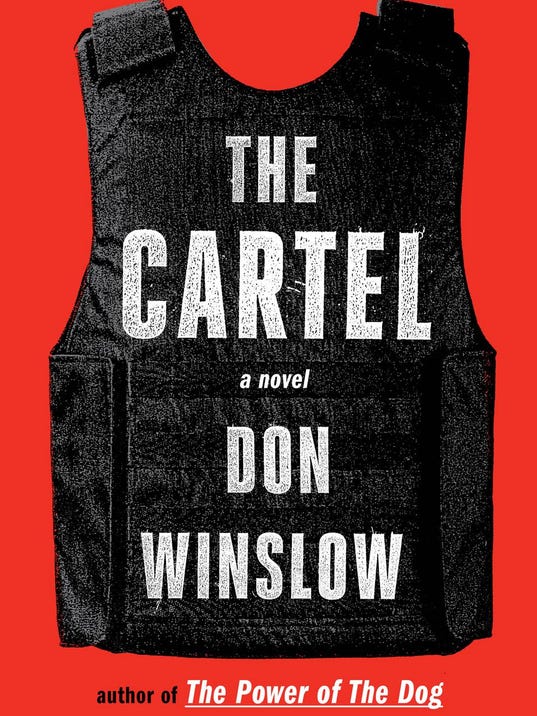Robert Anglen, The Republic | azcentral.com
June 19, 2015

It started with a massacre and a question about the nature of evil. It has evolved into the most important crime saga of the new millennium. Think "The Godfather" of the recreational-drug generation.
In 1998, crime writer Don Winslow set out to find what would compel someone to line up 19 women and children against a wall in a town just south of the California border and machine gun them.
His answer came seven years later with "The Power of the Dog," an epic, soul-searing novel chronicling three decades of the Mexican-American drug war. A fictional account of the massacre became the book's set piece. At the time, it was hard to imagine a more savage act of violence.
Jump ahead 10 years and 100,000 bodies. Mexico's drug war has turned the country into an abattoir, and Winslow is about to release "The Dog's" long-anticipated follow up, "The Cartel."
The 19 murders so shocking in 1998 have become drops in a vast bloody bucket of human misery spilling across the Mexican landscape.
To call the "Cartel" a sequel is a misnomer. It better serves as a 640-page climax to "The Dog," a stunning denouement of America's failed interdiction policies as told through the eyes of people on both sides of the border who have suffered its consequences.
"The Cartel" is fiction in the same way Upton Sinclair's "The Jungle" is fiction. This is reporting and expose built around an intricate plot, finely etched characters and whip-crack dialogue. Storytelling that matters.
Winslow sets the tone before the first page, with a dedication listing the names of 128 Mexican journalists who were murdered or "disappeared." Winslow uses their work like an avenging angel, wrapping their headlines and stories around his narrative to give the violence context.
You want to understand the short, terror-filled life of a drug mule? What traumas will turn a teenage boy into a sociopathic killer? The pressures that make an honest cop take a bribe? Why a friend would sell out his friend? Winslow doesn't just tell you, he makes you eat their pain.
He also makes you witness to their courage. An aged rancher willing to fight and die rather than turn over his land to the cartel. Women who accept jobs as police officers, council members and mayors knowing their predecessors were murdered. Journalists who keep writing the truth amid threats of death.
There are beheadings, acid baths, shootings, stabbings, dismemberments, beatings, torture, gang rape, robberies, overdoses, eviscerations and assassinations. But, and this is important, "The Cartel" never loses its soul.
Unlike Robert Bolano's crushing roll-call of the dead in his book "2666", centered on the murdered women of Ciudad Juarez, Winslow never descends into morbidity. He's too busy riding the rage of his characters.
"Mexico, the land of pyramids and palaces, deserts and jungles, mountains and beaches, markets and gardens, boulevards and cobblestoned streets, broad plazas and hidden courtyards, is now known as a slaughter ground. And for what? So Americans can get high."
"The Cartel" seamlessly picks up where "The Dog" left off in 2004. Former DEA agent Art Keller has retreated into physical and emotional isolation after abandoning any shred of idealism to capture cartel kingpin Adan Barrera.
But from inside his San Diego prison cell, Barrera puts into motion a long-range plan that will get him transferred to Mexico, allow him to rebuild his empire and, as a sweetener, kill Keller.
Winslow uses their personal vendetta, of move and counter move, as a backdrop for details of cartel politics, military planning, smuggling operations and the banal bureaucracy of drug policy.
Winslow was an accomplished crime writer before "The Power of the Dog." In the early 1990s, he wrote a memorable, darkly comic series featuring a hip reluctant private investigator whose debt to mysterious corporate benefactors led him around the globe.
He followed with stories steeped in the Southern California surf ethos, virtually creating a coastal-noir genre with "California Fire and Life" and "The Death and Life of Bobby Z."
"The Dog" was a departure; call it ascendance. Winslow said he always felt "The Dog" was more about religion than drugs. But drugs fueled the narrative — and influenced his writing. He delivered the nihilistic and appropriately named "Savages," which Oliver Stone faithfully adapted into a 2012 film (forgive the last two minutes), and a prequel, the "Kings of Cool."
These were decidedly different books. Both dealt with the costs of recreational drug use. Social commentaries. Crime stories with an edge of humor sharp enough to flay.
Winslow said most Americans don't understand the drug war. But "The Cartel" provides an uneasy truth about America's addiction. Who is the cartel? We are.
"We buy this (stuff)," Winslow said. "I've never seen a cartel member hold a gun to an American's head and say do this coke. That doesn't happen. It's voluntary."
No comments:
Post a Comment